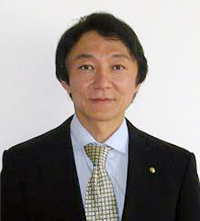Staff
-

ProfessorTakehiro NakamuraTakehiro Nakamura
-
Associate ProfessorNaoyuki HimiNaoyuki Himi
-
Assistant ProfessorEmi MaruyamaEmi Maruyama
Current research projects
We are studying the mechanisms of restoration in motor and cognitive functions by rehabilitation, in CNS diseases including stroke and spinal cord injury. Pathological mechanisms in neuropsychiatric disorders such as depression are also being studied. Ongoing research projects are as follows:
- Mechanisms of beneficial effects of electrical stimulation (ES) of skeletal muscle on motor recovery after spinal cord injury
We are investigating the action of ES induced brain-derived neurotrophic factor (BDNF) in both the muscle and the spinal cord on motor recovery. (Hayashi N. et al., Spine J 2019). - Mechanisms of neural network remodeling underlying motor map reorganization induced by rehabilitative training after ischemic stroke Neurons projecting to the upper cervical cord provide new connections to the denervated forelimb area of the spinal cord. These new connections may contribute to rehabilitation-induced task specific recovery and motor map reorganization (Okabe N. et al. Neurosci 2016).
- Mechanisms of cognitive recovery by treadmill training after ischemic stroke
Exercise elevates hippocampal BDNF levels in the early stage after cerebral embolism, and this event facilitates memory function recovery (Himi N. et al. J Stroke Cerebrovasc Dis 2016). - Therapeutic effect of a novel synthesized nucleoside analogue, COA-Cl, on both stroke and spinal cord injury
COA-Cl has neuroprotective effect against ischemic and hemorrhagic brain damage probably mediated by ERK1/2 and purinergic receptors. We are investigating its potency also as a therapeutic agent for spinal cord injury (Okabe N. et al. Brain Res 2013; Lu F. et al. J Stroke Cerebrovasc Dis 2016). - Mechanisms of stress-induced depression by using model mice
We are trying to characterize Ca2+ kinetics in the hippocampal neurons of depressive state and develop a novel approach to treatment of depression.

